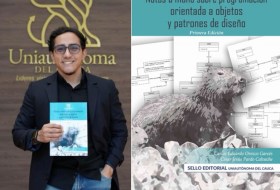News
Unicauca Systems Engineering graduate presents his book on developing object-oriented design skills.
"Handwritten Notes on Object-Oriented Programming and Design Patterns" is a publication by Carlos Eduardo Orozco and César Pardo, under the Editorial Seal of the Universidad Autónoma del Cauca (Uniautónoma). It is aimed at both students and experienced professionals, serving as a tool for developing skills in object-oriented design and the effective implementation of design patterns in software projects.
The book emerged due to existing literature being geared towards an audience with advanced knowledge in software design. Thus, Carlos Eduardo Orozco, a graduate of the Systems Engineering program at the University of Cauca, presents the book "Handwritten Notes on Object-Oriented Programming and Design Patterns," co-authored with University of Cauca professor César Pardo.
The publication was officially presented on November 9th at the auditorium of the Universidad Autónoma del Cauca as part of the inauguration of the institution's editorial seal. It serves as a notable resource in this field by presenting the main object-oriented design patterns in a clear and pragmatic manner. "It aims to contribute to the state of knowledge related to software analysis and design patterns in the context of Software Engineering," states Carlos Eduardo Orozco, who is currently studying Astronomy at the University of Antioquia.
The work was published on June 26, 2023, through the Editorial Seal of the Universidad Autónoma del Cauca (Uniautónoma). In it, the authors introduce fundamental concepts related to object-oriented design and provide detailed explanations of each of the 23 most popular design patterns in the Software Engineering context. The book stands out for using a fresh style to present concepts considered by many as "complex" or "difficult to understand."
"It aims to be material that is easily understood by Systems Engineering, Computer Science, or related field students; by professors who require support material in Object-Oriented Programming, Software Engineering, Software Design and/or Analysis courses, among others; professionals who need supporting material to learn or reinforce concepts taught in their classes; or self-taught enthusiasts seeking to study aspects related to software design and analysis."
Since its release, it has made an impact on the academic and professional community in Colombia and other parts of the world. According to the count of individuals interested in the manuscript, the work has piqued the interest of academics and professionals in 16 cities nationwide, including places like: Barranquilla, Bello, Bogotá, Bolívar, Cali, Cundinamarca, Envigado, Floridablanca, Huila, La Estrella, Magdalena, Medellín, Popayán, Rionegro, Sabaneta, and Tolima. Similarly, individuals from different countries such as Argentina, Chile, Ecuador, Spain, Mexico, and Venezuela have expressed interest in acquiring the work. Particularly, the work has received positive reviews from the general public, being considered material that provides high value in topics related to software design and analysis in the context of Software Engineering.
The work has been reviewed and endorsed by references in Software Engineering such as PhD Mario Piattini Velthuis, a professor and researcher at the School of Computer Science of the Universidad de Castilla - La Mancha (UCLM), author of numerous scientific articles and books, and also a recognized professional in the top 20 most important researchers in Europe. Likewise, it has the endorsement of PhD Hanna Oktaba, retired professor from the Faculty of Sciences at the National Autonomous University of Mexico, coordinator of the Mexican standard MoProSoft, editor of the ISO/IEC 29110 standard, and a key collaborator in the ESSENCE standard.
Currently, Carlos Eduardo Orozco is working on the publication of three additional volumes related to: programming fundamentals, advanced concepts in software engineering, and an introduction to software architecture.
About the authors:
Carlos Orozco is an occasional undergraduate professor at the University of Antioquia and an occasional postgraduate professor at the Universidad EAFIT, a member of the Information Technologies Research Group - GTI, Colombia. He holds a degree in Systems Engineering (2018), a Master's in Computing (2020) from Unicauca, and is an undergraduate student in Astronomy at UdeA. Currently, he actively works in the industry as a Java Specialist, Software Architect, Development Leader, roles he performs as an independent professional through specialized services and consultancy throughout Latin America.
César Pardo is a professor at the University of Cauca and a member of the Information Technologies Research Group - GTI. He holds a degree in Systems Engineering from Unicauca (2006), a PhD (2012), and a Master's (2009) in Computer Engineering from the University of Castilla - La Mancha, Spain. He is a teacher, researcher, and consultant with over 16 years of experience in topics related to gender (inclusion, leadership, and equality), social debt in the software industry, process debt, technical debt, DevOps, scaled agile approaches, product and process quality, software process improvement, global software development, Alzheimer's, and pervasive games, bad smells in software requirements, community smells in software development, hybrid models, and agile approaches for team management and product and service development. He is the author and co-author of over 170 publications including articles, book chapters, and conferences at national and international levels, which allowed him to be among the most cited Colombians through Google Scholar in 2015, 2016, and 2017.


